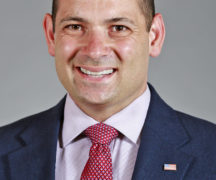BG Independent News posed a series of written questions to legislative candidates. Below are the answers submitted by Laurel Johnson, the Democratic candidate for the Third District in the Ohio House. Haraz Ghanbari, the Republican incumbent, refused to participate.
Laurel Johnson grew up in Wood County. She is from a working-class family and graduated from Otsego High School at the height of the Recession. A first-generation college graduate, she transferred from Owens Community College to Kent State University where she earned her Bachelor’s degree in Communication Studies. Laurel also studied state issues in Columbus and interned for State Senator Edna Brown. She now works as a medical marijuana dispensary agent, engaging with folks from across the state. Laurel’s main legislative priorities are to strengthen public schools, expand access to healthcare, and protect the environment for future generations.
Do you favor the repeal of House Bill 6? In explaining your stance please address the
effect this will have on green energy in the state.
JOHNSON: I support repealing HB 6. Instead of giving more than $1 billion to a handful of energy companies, we should be investing in green energy such as wind and solar. We also
need to restore the renewable energy and energy efficiency standards that HB 6
rolled back.
GHANBARI: No response.
How do you propose to address the financing of public education given the property-
based system was found to be unconstitutional in 1997?
JOHNSON: First, Ohio needs to ensure that public tax dollars allocated to education goes only to public schools. Second, we need to shift the tax burden off communities by
increasing the state’s share of funding.
GHANBARI: No response.
Should the U.S. Supreme Court overturn Roe v. Wade, would you favor a ban on
abortion in Ohio?
JOHNSON: I will always support the right to choose regardless of the U.S. Supreme Court’s
decision.
GHANBARI: No response.
What needs to be done to address the distrust of police by some citizens?
JOHNSON: We need to prioritize funding resources for those in need in our communities and
building relationships between law enforcement and the communities they serve by
providing safe spaces for them to connect. We need to ensure that qualified
immunity will not nullify justice by maintaining transparency and accountability.
GHANBARI: No response.
Should the state legislature have more control over public health orders? Should the
legislature be able to override these decisions by the administration?
JOHNSON: I think that the state legislature should allow the Director of the Ohio Department of
Health to use the authority their appointment grants them to do their job.
Impeachment and lawsuits exist to hold the administration accountable should a
health order necessitate either.
GHANBARI: No response.




